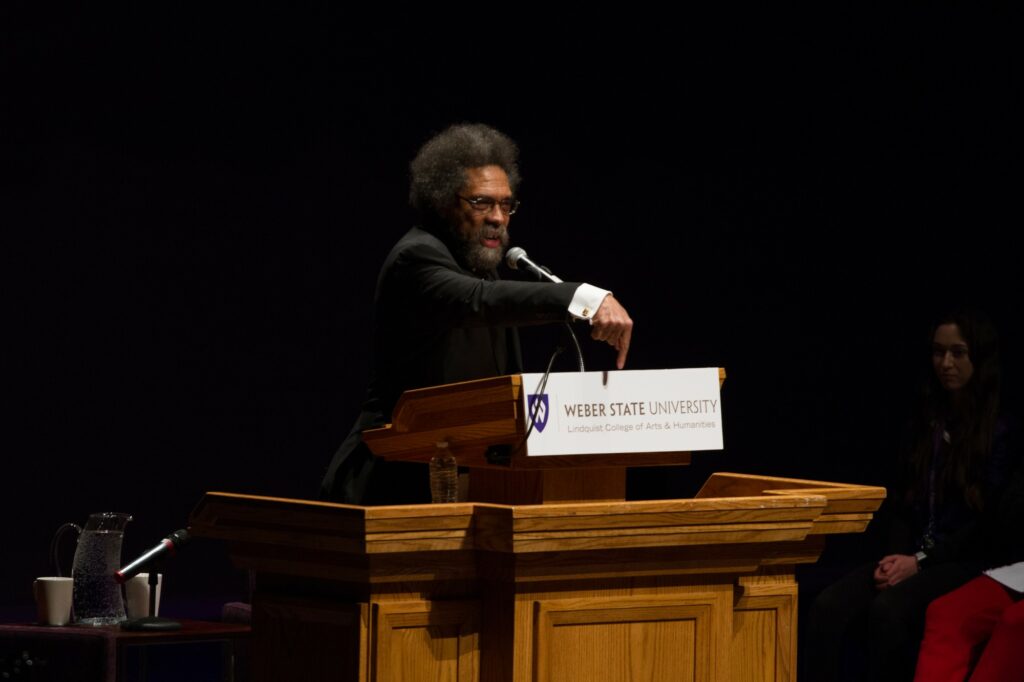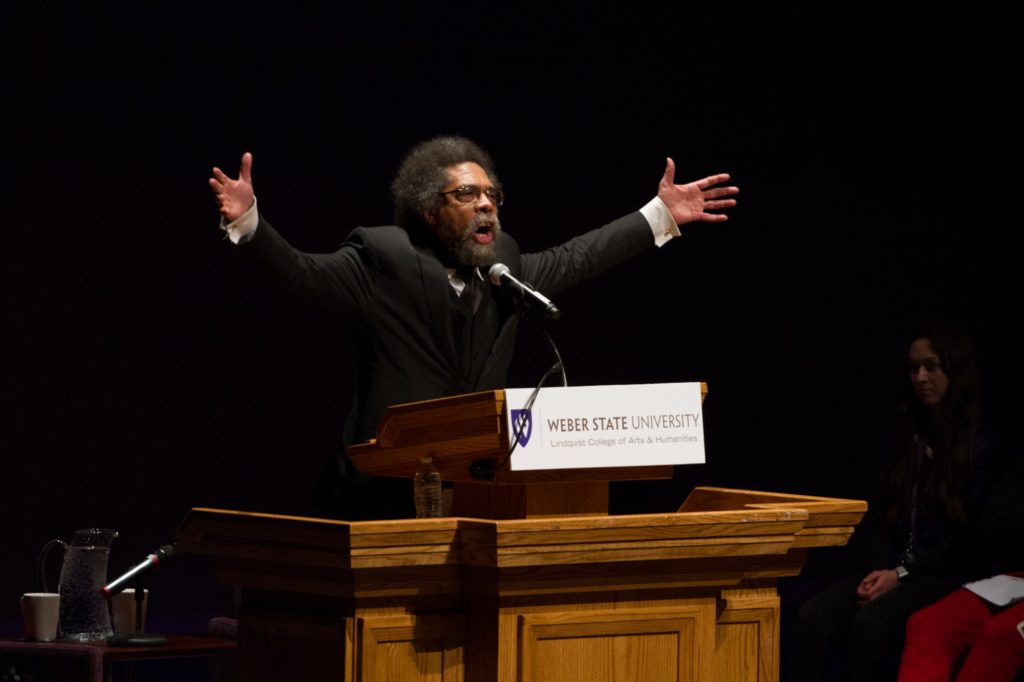Philosopher and political activist Cornel West addressed a record-breaking crowd during his visit to Weber State University on Jan. 12, the weekend of Martin Luther King, Jr. Day. West spoke on civility in modern times as part of the university’s ongoing Engaged Learning Series on civility, which will continue until the end of the 2017–18 school year.
Lindquist College of Arts and Humanities Dean Scott Sprenger expressed his gratitude for West’s arrival, calling him “one of America’s most compelling intellectuals.” He added that West’s visit was “uncannily timely,” referring to the approaching 25th anniversary of West’s landmark book, “Race Matters.”

Sprenger believed West was the ultimate candidate to discuss the issues of civility in the modern world. “He is the perfect guest to reignite our campus-wide discussion on civility and how we ought to conduct ourselves with fellow citizens in an age of appalling incivility and political polarization,” Sprenger said.
West, who had flown in from Denver earlier in the day, covered a multitude of subjects over the course of his hour-long stance at the podium. Topics ranged from his early life and education to the influence Martin Luther King, Jr. continues to have on the modern political landscape, as well as political issues concerning President Donald Trump.
“Let us not … think, somehow, that Donald Trump speaks for more Americans than he does, even though he does speak for too many,” West said.
The event sold out, its audience including high school students from around Northern Utah and out-of-state residents from Idaho, Arizona, Arkansas and Iowa. Before West began his speech, he recognized many of the patrons on stage with him.
West acknowledged Stuart Peterson, whose father, Chase N. Peterson, was the dean of admissions at Harvard University in 1967 and actively called on the college to recruit students from minority groups. Peterson invited David Evans to be one of the first African-Americans on Harvard’s admissions committee.
West then expressed his gratitude to the Peterson family for the resulting increase in African-American enrollment at what was previously a predominantly white university.
“Now, Harvard brags about their diversity, but it would not be without Chase Peterson; it would not be without David Evans,” West said. “(Without them), I wouldn’t be standing here as a graduate of Harvard.”

West is a professor of religion and philosophy writer and has held chairs and taught at institutions ranging from Harvard to Princeton, from Yale to the University of Paris. Aside from “Race Matters,” West has authored over 30 other books, including “The Radical King,” “Truth Matters: A Love Revolution Featuring the Words & Work of Cornel West” and “The Rich and the Rest of Us.”
West’s most recent book, “Black Prophetic Fire” with Christa Buschendorf, has six biographical sketches of historic black figures, including Frederick Douglass, Malcolm X, Martin Luther King, Jr., Ida B. Wells, W.E.B. DuBois and Ella Baker of the Occupy Movement.
During his speech, West alluded to the United States living in the midst of one of its most difficult stretches in recent memory.
West acknowledged the divide in the American people. “We could very well be living in the process of the decline and decay of the American empire,” West said.
He thinks Americans can use their history of fighting against prejudice to unite as one people. West counted the number of issues dividing Americans today, factors like race, sexuality, gender and class. He believes Americans can use these differences as a source of empowerment.
West reminded the audience of the empires that fell due to military overreach and the corruption of economic elites, posing the question of what the American people would say when the American empire fell.
“What will the American people say when she or he puts pen to paper and writes the story of the decline and decay of the American empire?” West asked. “What role will we play?”
West is sure African-Americans have done their part to shape America’s history.
“I come from a black people who, from the very beginning, saw the catastrophe of America in change,” West said. “Yet we still mustered the fortitude to say we’re going to fight anyway. We’re going to tell the truth anyway. We’re going to cut against the grain anyway. We’re going to keep on pushing, keep on swinging like Muhammad Ali and swinging like Ella Fitzgerald. We’re going to keep the love in the swing.”
West believes Americans need to connect with other artists and human beings who gave all they had to combat injustice. He mentioned Ray Charles and Aretha Franklin, who emptied themselves every time they got on a stage.
“Here lived a person who used every element of who they were,” West said. “When they put that microphone down and pushed that piano out, they said ‘Oh, Lord, did we have a time tonight. I feel better. I’m ready to fight.’ That’s what we need.”




















